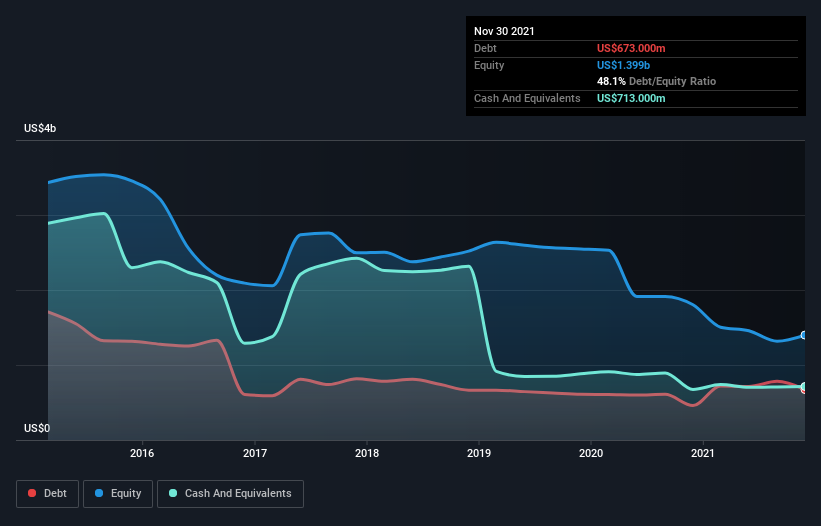
The external fund manager backed by Berkshire Hathaway's Charlie Munger, Li Lu, makes no bones about it when he says 'The biggest investment risk is not the volatility of prices, but whether you will suffer a permanent loss of capital.' When we think about how risky a company is, we always like to look at its use of debt, since debt overload can lead to ruin. We can see that BlackBerry Limited (TSE:BB) does use debt in its business. But the real question is whether this debt is making the company risky.
What Risk Does Debt Bring?
Debt is a tool to help businesses grow, but if a business is incapable of paying off its lenders, then it exists at their mercy. Ultimately, if the company can't fulfill its legal obligations to repay debt, shareholders could walk away with nothing. However, a more common (but still painful) scenario is that it has to raise new equity capital at a low price, thus permanently diluting shareholders. Having said that, the most common situation is where a company manages its debt reasonably well - and to its own advantage. The first step when considering a company's debt levels is to consider its cash and debt together.
See our latest analysis for BlackBerry
What Is BlackBerry's Net Debt?
The image below, which you can click on for greater detail, shows that at November 2021 BlackBerry had debt of US$673.0m, up from US$459.0m in one year. However, its balance sheet shows it holds US$713.0m in cash, so it actually has US$40.0m net cash.

How Healthy Is BlackBerry's Balance Sheet?
Zooming in on the latest balance sheet data, we can see that BlackBerry had liabilities of US$409.0m due within 12 months and liabilities of US$791.0m due beyond that. Offsetting these obligations, it had cash of US$713.0m as well as receivables valued at US$164.0m due within 12 months. So its liabilities outweigh the sum of its cash and (near-term) receivables by US$323.0m.
Given BlackBerry has a market capitalization of US$4.69b, it's hard to believe these liabilities pose much threat. However, we do think it is worth keeping an eye on its balance sheet strength, as it may change over time. While it does have liabilities worth noting, BlackBerry also has more cash than debt, so we're pretty confident it can manage its debt safely. The balance sheet is clearly the area to focus on when you are analysing debt. But ultimately the future profitability of the business will decide if BlackBerry can strengthen its balance sheet over time. So if you're focused on the future you can check out this free report showing analyst profit forecasts.
Over 12 months, BlackBerry made a loss at the EBIT level, and saw its revenue drop to US$743m, which is a fall of 23%. That makes us nervous, to say the least.
So How Risky Is BlackBerry?
We have no doubt that loss making companies are, in general, riskier than profitable ones. And in the last year BlackBerry had an earnings before interest and tax (EBIT) loss, truth be told. Indeed, in that time it burnt through US$29m of cash and made a loss of US$447m. But the saving grace is the US$40.0m on the balance sheet. That kitty means the company can keep spending for growth for at least two years, at current rates. Summing up, we're a little skeptical of this one, as it seems fairly risky in the absence of free cashflow. The balance sheet is clearly the area to focus on when you are analysing debt. But ultimately, every company can contain risks that exist outside of the balance sheet. For instance, we've identified 3 warning signs for BlackBerry that you should be aware of.
When all is said and done, sometimes its easier to focus on companies that don't even need debt. Readers can access a list of growth stocks with zero net debt 100% free, right now.
If you're looking to trade BlackBerry, open an account with the lowest-cost platform trusted by professionals, Interactive Brokers.
With clients in over 200 countries and territories, and access to 160 markets, IBKR lets you trade stocks, options, futures, forex, bonds and funds from a single integrated account.
Enjoy no hidden fees, no account minimums, and FX conversion rates as low as 0.03%, far better than what most brokers offer.
Sponsored ContentValuation is complex, but we're here to simplify it.
Discover if BlackBerry might be undervalued or overvalued with our detailed analysis, featuring fair value estimates, potential risks, dividends, insider trades, and its financial condition.
Access Free AnalysisHave feedback on this article? Concerned about the content? Get in touch with us directly. Alternatively, email editorial-team (at) simplywallst.com.
This article by Simply Wall St is general in nature. We provide commentary based on historical data and analyst forecasts only using an unbiased methodology and our articles are not intended to be financial advice. It does not constitute a recommendation to buy or sell any stock, and does not take account of your objectives, or your financial situation. We aim to bring you long-term focused analysis driven by fundamental data. Note that our analysis may not factor in the latest price-sensitive company announcements or qualitative material. Simply Wall St has no position in any stocks mentioned.
About TSX:BB
BlackBerry
Provides intelligent security software and services to enterprises and governments worldwide.
Excellent balance sheet and fair value.
Similar Companies
Market Insights
Community Narratives



